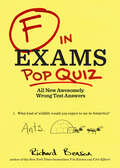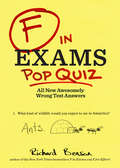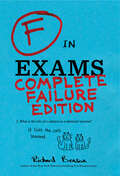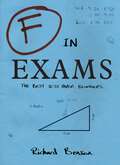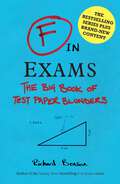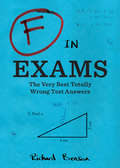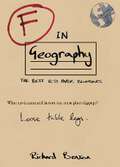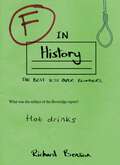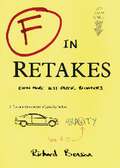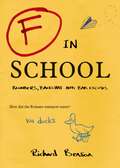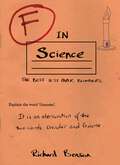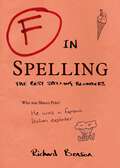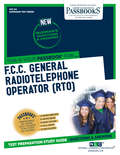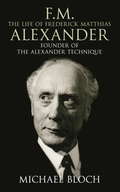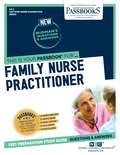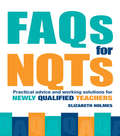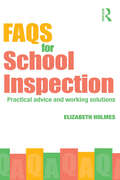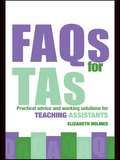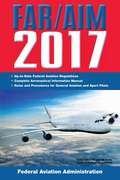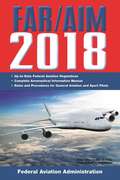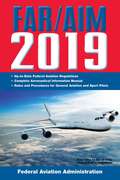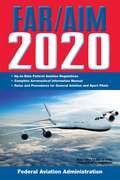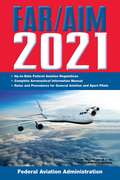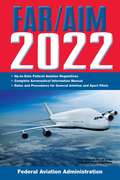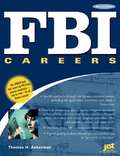- Table View
- List View
F in Exams Pop Quiz: All New Awesomely Wrong Test Answers (F in Exams)
by Richard BensonWill some students ever learn from their mistakes? We hope not! A new collection of real—and really hilarious—wrong answers.This all-new collection of hilarious, totally wrong, real test answers serves a fresh batch of A+ wit misapplied to F- quiz scores. A little studying would reveal that the most powerful light source known to man isn’t “lightsabers,” nor do we salt the roads when it snows “to make them taste better.” But where’s the fun in that? From the same wellspring of failure as the million-selling F in Exams series, this special pop quiz collection will amuse and entertain anyone preparing to face down a test paper as well as those just glad to be far away from a classroom.
F in Exams: All New Awesomely Wrong Test Answers
by Richard BensonWill some students ever learn from their mistakes? We hope not! This all-new collection of hilarious, totally wrong, real test answers serves a fresh batch of A+ wit misapplied to F- quiz scores. A little studying would reveal that the most powerful light source known to man isn't lightsabers
F in Exams: Complete Failure Edition (F in Exams)
by Richard BensonFour books in one: The ultimate compendium of the New York Times–bestselling series filled with hilariously wrong test answers from real-life classrooms. This fun omnibus features the complete content from all four books in the popular series—F in Exams, F for Effort, F this Test, and F in Exams: Pop Quiz—plus more than one hundred brand-new, sadly real, hilariously wrong, and sometimes admirably creative student answers (Q: What is the role of a catalyst in a chemical reaction? A: It lists the cats involved). Also including bonus trivia in the form of &“Stuff They Should Have Taught Us in School&” facts (did you know a sneeze can travel up to 100 MPH?), this A+ collection will amuse anyone facing down a test as well as those happy to have the classroom behind them.
F in Exams: The Best Test Paper Blunders (F In Exams Ser.)
by Richard BensonYou’ve been studying hard, the day of the BIG test arrives, you turn over the paper, and ‘what the *&%@ does that mean?!’ Some students adopt a creative approach to answering those awkward exam questions. Packed full of hilarious examples, this book will bring a smile to the face of teachers, parents and students alike.
F in Exams: The Big Book of Test Paper Blunders
by Richard BensonBursting with head-scratching exam answers, this collection brings together the most side-splitting examples from the F in Exams series.
F in Exams: The Very Best Totally Wrong Test Answers (F in Exams)
by Richard BensonScore some &“instant comic relief&” from students who decided that if they were going to fail, they were going to go down in a blaze of glory—and laughs (Daily Glow). F stands for &“funny&” in this perfect book for students or anyone who has ever had to struggle through a test and needs a good laugh. Celebrating the creative side of failure in a way we can all relate to, F in Exams gathers the most hilarious and inventive test answers provided by students who, faced with a question they have no hope of getting right, decide to have a little fun instead. Whether in science (Q: What is the highest frequency noise that a human can register? A: Mariah Carey), the humanities (Q: What did Mahatma Gandhi and Genghis Khan have in common? A: Unusual names), math, or other subjects, these 250 entries prove that while everyone enjoys the spectacle of failure, it&’s even sweeter to see a FAIL turn into a WIN.
F in Geography (F In Exams Ser.)
by Richard BensonIf you get perspiration and precipitation confused, then take comfort in this hilarious, all-new, fun-size dose of F in Exams, containing some of the most cringeworthy howlers from school Geography exams.
F in History (F In Exams Ser.)
by Richard BensonIf you don’t know a cold war from a cold sore, then take comfort in this cracking, all-new, fun-size dose of F in Exams, containing some of the worst howlers from school history exams.
F in Retakes: Even More Test Paper Blunders (F In Exams Ser.)
by Richard BensonThe F in Exams are over, the results are in and just when you thought it was safe to go back in the classroom… BANG! It’s time for F in Retakes! Enjoy another heady dose of hilarious answers that canny students have given to the trickiest exam questions.
F in School: Blunders, Backchat and Bad Excuses (F In Exams Ser.)
by Richard BensonAhh, glorious school days… It’s no wonder they went so quickly with all the exams, the classroom fun, the sticky situations to get out of, the work to avoid and the teachers to annoy. Enjoy this new collection of hilarious exam answers, along with schoolyard jokes, amusing doodles, silly excuses, spelling slip-ups and loads more!
F in Science (F In Exams Ser.)
by Richard BensonIf the thought of science exams conjures up the memory of singeing your eyebrow on a Bunsen burner, then take comfort in this cracking, all-new, funsize dose of F in Exams, containing some of the most glorious howlers from school science exams.
F in Spelling: The Funniest Test Paper Blunders (F In Exams Ser.)
by Richard BensonWe all know that the written word is full of traps for the unwary, and this goes double for those in their early years of learning it. Enjoy this collection of side-splitting spelling slip-ups ranging from the charming to the ridiculous, and the cute to the unintentionally X-rated!
F.C.C. GENERAL RADIOTELEPHONE OPERATOR: Passbooks Study Guide (Admission Test Series)
by National Learning CorporationThe Admission Test Series prepares students for entrance examinations into college, graduate and professional school as well as candidates for professional certification and licensure. The F.C.C. General Radiotelephone Operator Passbook® prepares you by sharpening the skills and abilities necessary to succeed on your upcoming entrance exam. It provides hundreds of questions and answers in the areas that will likely be covered on your upcoming exam.
F.M.: Founder of the Alexander Technique
by Michael BlochThe Alexander Technique is a method of muscular re-education, which has become standard training for actors, dancers and singers, and is practised for health reasons all over the world. Its founder, Frederick Matthias Alexander (1869-1955), was an Australian actor who stumbled upon it in the 1890s after studying himself in mirrors to discover why he had lost his voice. He realised that most people suffered from the same postural defects he had noticed in himself, and that this explained much of what went wrong with them. F.M. (as he was known) came to London in 1904 and became enormously successful. During the First World War he practised in America with equal success, converting the American philosopher John Dewey to his cause. He wrote four books (all still in print), and his supporters included Aldous Huxley, George Bernard Shaw and Stafford Cripps. He was, however, a difficult and argumentative man who made enemies. Towards the end of his life he embarked on a libel action against the South African government, which had accused him of charlatanism. He won, and went on practising and propagating his technique until his death aged 86.
FAMILY NURSE PRACTITIONER: Passbooks Study Guide (Certified Nurse Examination Series)
by National Learning CorporationThe Certified Nurse Examination Series prepares individuals for licensing and certification conducted by the American Nurses Credentialing Center (ANCC), the National Certification Corporation (NCC), the National League for Nursing (NLN), and other organizations. The Family Nurse Practitioner Passbook® provides a series of informational texts as well as hundreds of questions and answers in the areas that will likely be covered on your upcoming exam.
FAQs for NQTs: Practical Advice and Working Solutions for Newly Qualified Teachers
by Elizabeth HolmesThis useful reference book offers authoritative yet accessible answers to common questions posed by new and trainee teachers as they face the practical everyday questions that arise from entering the classroom for the first time. Organized into sections the book covers issues such as: job hunting induction managing workload relationship building with pupils and colleagues dealing with parents other personal yet work-related issues. The issues covered are ones that have been highlighted through Elizabeth Holmes' work as an online agony aunt for teachers and her column 'Ask Elizabeth' on Eteach.com. Based on real questions with common themes this will be a welcome resource for any NQT.
FAQs for School Inspection: Practical Advice and Working Solutions
by Elizabeth HolmesSchool inspections still have the potential to spread fear and panic through even the best-run schools, but this practical book will remove all of the anxiety, with its proven advice to help ensure a successful inspection. Ideal for all teachers, whether newly qualified or with decades of experience, FAQs for School Inspection will guide the reader calmly through the pre- and post-inspection stages, offering valuable insights into what can happen during the inspection itself. Covering recent legislative changes and everything to do with school inspection, it outlines the teacher/inspector relationship and gives advice on coping with the potential stresses of inspections. Organised into logical sections, the book covers issues such as preparing for inspection being inspection-aware the effects inspection has on you personally what happens after inspection. Complete with advice on using inspection to further personal and professional development, this ready-reference guide will allow teachers to play a confident and influential role in school inspection.
FAQs for TAs: Practical Advice and Working Solutions for Teaching Assistants
by Elizabeth HolmesFAQs for TAs is a friendly and accessible guide covering the core questions that both new and existing teaching assistants may have about their jobs. Arranged in question and answer format, it covers all the essential information that teaching assistants need to know in an easily accessible book. It includes: the themes of becoming a teaching assistant (training and funding possibilities, finding vacancies and getting through the selection process) what the job entails getting started, managing workload dealing with behaviour working with colleagues. Differing from others on the market in that it focuses specifically on the core ‘need to know’ items for TAs, this book is authoritative and reassuring - delivering exactly what TAs need to help them on the job. It also explores areas of possible future development and career progression combined with sources of further information.
FAR/AIM 2017: Federal Aviation Regulations / Aeronautical Information Manual (Far/aim Ser.)
by Federal Aviation AdministrationLearn to fly a plane according to Federal Aviation Administration (FAA) regulationsThe most complete guide to the rules of aviation accessible anywhere Contains all of the information needed to operate safely in US airspace and is fully updatedIf you are an aviation enthusiast or an aviator, you need to have the newest edition of the FAR/AIM. In the most recent edition of the FAR/AIM, produced by the FAA, all procedures, illustrations, and regulations are up-to-date and reflect current FAA data. Learn about takeoffs and landings, land navigation, how to aid climb, world flight patterns, flying rolls, academic liftoff, and more. This useful reference book is a critical resource for all members of the aviation community, including aspiring pilots seeking a concrete background in the rules, procedures, and requirements of flight training. This manual also includes: A study guide for specific pilot training certifications and ratingsStandard instrument proceduresA pilot/controller glossaryParachute operationsThe NASA Aviation Safety reporting formAirworthiness standards for products and partsImportant FAA contact information
FAR/AIM 2018: Federal Aviation Regulations And Aeronautical Information Manual (includes Changes 1 And 2) (FAR/AIM Federal Aviation Regulations)
by Federal Aviation AdministrationAll the information you need to operate safely in US airspace, fully updated.If you’re an aviator or aviation enthusiast, you cannot be caught with an out-of-date edition of the FAR/AIM. In today’s environment, there is no excuse for ignorance of the rules of the US airspace system. In the newest edition of the FAR/AIM, all regulations, procedures, and illustrations are brought up to date to reflect current FAA data. This handy reference book is an indispensable resource for members of the aviation community, as well as for aspiring pilots looking to get a solid background in the rules, requirements, and procedures of flight training. Not only does this manual present all the current FAA regulations, it also includes:A study guide for specific pilot training certifications and ratingsA pilot/controller glossaryStandard instrument proceduresParachute operationsAirworthiness standards for products and partsThe NASA Aviation Safety reporting formImportant FAA contact informationThis is the most complete guide to the rules of aviation available anywhere. Don’t take off without the FAR/AIM!
FAR/AIM 2019: Up-to-date Faa Regulations / Aeronautical Information Manual (FAR/AIM Federal Aviation Regulations)
by Federal Aviation AdministrationAll the information you need to operate safely in US airspace, fully updated.If you’re an aviator or aviation enthusiast, you cannot be caught with an out-of-date edition of the FAR/AIM. In today’s environment, there is no excuse for ignorance of the rules of the US airspace system. In the newest edition of the FAR/AIM, all regulations, procedures, and illustrations are brought up to date to reflect current FAA data. This handy reference book is an indispensable resource for members of the aviation community, as well as for aspiring pilots looking to get a solid background in the rules, requirements, and procedures of flight training. Not only does this manual present all the current FAA regulations, it also includes:A study guide for specific pilot training certifications and ratingsA pilot/controller glossaryStandard instrument proceduresParachute operationsAirworthiness standards for products and partsThe NASA Aviation Safety reporting formImportant FAA contact informationThis is the most complete guide to the rules of aviation available anywhere. Don’t take off without the FAR/AIM!
FAR/AIM 2020: Up-to-Date FAA Regulations / Aeronautical Information Manual (FAR/AIM Federal Aviation Regulations)
by Federal Aviation AdministrationAll the Information you Need to Operate Safely in US Airspace, Fully Updated If you&’re an aviator or aviation enthusiast, you cannot be caught with an out-of-date edition of the FAR/AIM. In today&’s environment, there is no excuse for ignorance of the rules of the US airspace system. In the newest edition of the FAR/AIM, all regulations, procedures, and illustrations are brought up to date to reflect current FAA data. This handy reference book is an indispensable resource for members of the aviation community, as well as for aspiring pilots looking to get a solid background in the rules, requirements, and procedures of flight training. Not only does this manual present all the current FAA regulations, it also includes: A study guide for specific pilot training certifications and ratingsA pilot/controller glossaryStandard instrument proceduresParachute operationsAirworthiness standards for products and partsThe NASA Aviation Safety reporting formImportant FAA contact informationThis is the most complete guide to the rules of aviation available anywhere. Don&’t take off without the FAR/AIM!
FAR/AIM 2021: Up-to-Date FAA Regulations / Aeronautical Information Manual (FAR/AIM Federal Aviation Regulations)
by Federal Aviation AdministrationAll the Information you Need to Operate Safely in US Airspace, Fully Updated If you&’re an aviator or aviation enthusiast, you cannot be caught with an out-of-date edition of the FAR/AIM. In today&’s environment, there is no excuse for ignorance of the rules of the US airspace system. In the newest edition of the FAR/AIM, all regulations, procedures, and illustrations are brought up to date to reflect current FAA data. This handy reference book is an indispensable resource for members of the aviation community, as well as for aspiring pilots looking to get a solid background in the rules, requirements, and procedures of flight training. Not only does this manual present all the current FAA regulations, it also includes: A study guide for specific pilot training certifications and ratingsA pilot/controller glossaryStandard instrument proceduresParachute operationsAirworthiness standards for products and partsThe NASA Aviation Safety reporting formImportant FAA contact informationThis is the most complete guide to the rules of aviation available anywhere. Don&’t take off without the FAR/AIM!
FAR/AIM 2022: Up-to-Date FAA Regulations / Aeronautical Information Manual (FAR/AIM Federal Aviation Regulations)
by Federal Aviation AdministrationAll the Information You Need to Operate Safely in US Airspace, Fully Updated If you&’re an aviator or aviation enthusiast, you cannot be caught with an out-of-date edition of the FAR/AIM. In the newest edition of the FAR/AIM, all regulations, procedures, and illustrations are brought up to date to reflect current federal regulations and FAA data, policies, and advisories. This handy reference book is an indispensable resource for members of the aviation community, as well as for aspiring pilots looking to get a solid background in the rules, requirements, and procedures of flight. Not only does this manual present current FAA information, it also includes: A guide for specific pilot training certifications and ratingsA pilot/controller glossaryStandard instrument proceduresParachute operationsAirworthiness standards for aircraft and partsFlight and pilot school informationImportant FAA contact detailsThis is the most complete guide to the rules of aviation available anywhere. Don&’t take off without the FAR/AIM!
FBI Careers: The Ultimate Guide to Landing a Job as One of America's Finest (2nd edition)
by Thomas H. AckermanFBI Careers is the only definitive guide to the organization's rigorous selection process. Its helpful information reveals what it takes to succeed in landing a job - for special agents as well as professional support personnel.
